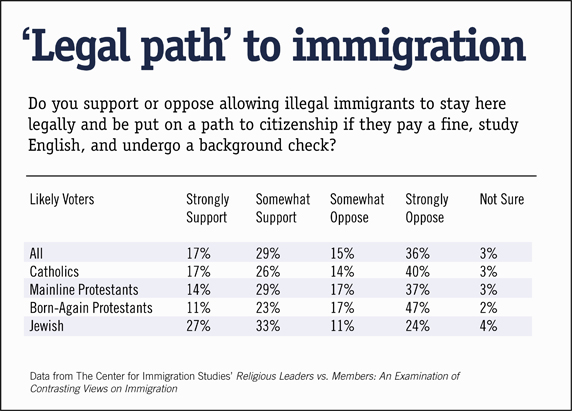|
World Jewish News

Photo by Leyden Communications (israelnewsagency.com)
|
Poll: Jews more conflicted on immigration than leadership
06.01.2010, Repatriation A new poll suggests that American Jews are more conflicted about the challenges of immigration than their communal leaders -- but that's to be expected, the Jewish leaders say.
The poll, commissioned by the pro-enforcement Center for Immigration Studies, shows that Jews who support "enforcing the law and causing [illegal immigrants] to return home over time" are statistically tied with Jews who favor "granting legal status and a pathway to citizenship to most illegal immigrants."
That dead heat -- 43 percent for enforcement and 40 percent for the "legal" path -- reflects conventional wisdom about Jews trending more liberal than other Americans. Among Roman Catholics and Protestants, substantial majorities favored the enforcement option.
Still, the figure -- along with other answers in the poll -- also suggests that rank-and-file Jews are not as unequivocal as their leaders in supporting immigration reform that encompasses a path to legal immigration.

Another question outlining proposed conditions for the "legal path," including fines, learning the English language and background checks, had 60 percent of Jews supporting and 35 percent opposing.
"It captures division in the community," said Steven Camarota, the CIS director of research. "Yet that diversity of opinion is in no way reflected in what the leadership is pushing."
The leadership did not disagree.
"We know that the Jewish community is not monolithic on this subject," said Richard Foltin, the American Jewish Committee's legislative director and counsel. "To the extent that it's a fair representation, there's a lot of education that needs to be done in the community."
Rabbi David Saperstein, who directs the Reform movement's Religious Action Center, said the leadership and the rank and file occasionally outpace one another on issues.
"It's not unusual for leadership to take a more assertive position on the issues than the amcha," he said, using the Hebrew term for the rank and file. "Sometimes the leadership is ahead, sometimes the grass roots is ahead -- it usually averages out."
Stephen Steinlight, a senior analyst with CIS who for six years has preached enforcement to Jewish audiences, said he couldn't help but experience a degree of Schadenfreude at the results.
"I feel vindicated," he said. "The survey signals a massive rejection against the worldview of the American Jewish establishment, which is monolithic. There's not a single organization represented in the JCPA," the Jewish Council for Public Affairs, the umbrella body for public policy groups, "that reflects these views."
The poll, carried out by Zogby International in December, was conducted through online panels. Such panels are controversial because respondents are self-selected, but as "cold calling" has become more expensive and more and more Americans are making themselves available online, pollsters have increasingly used the method, particularly in assessing the views of small demographic subgroups.
Zogby reached 1,647 Jewish respondents, which it said represented a margin of error of 2.5 percentage points.
Saperstein said that he was reassured to see that Jewish respondents were more likely than members of other religious communities to embrace the "legal path" option.
"I'm not surprised the difference is smaller than in the general community," he said. "We're the immigrant community, the quintessential community of those fleeing deprivation and seeking freedom."
That model no longer held, Steinlight said.
Jews "want an immigration policy based on not 'what was good for my grandparents' but 'what's good for my grandchildren,'" he said. "This country is the safest country for Jews outside of Israel, and anything that threatens to change the nature of this country is a risk."
Steinlight said he expected Jewish percentages of those favoring enforcement and opposed to a "legal path" to catch up with non-Jewish percentages over time. The lower numbers, he said, were a result of pressures from Jewish leaders.
Jews "need permission to say, 'you know, I don't like this very much' " when it comes to current immigration policy, he said.
Saperstein and Foltin rejected notions that the leadership was dictating policy; longstanding positions in both organizations were the result of extensive consultations with the grass roots, they said. Current Reform policy on a legal path to immigration passed by a 9-1 margin in a poll of the movement's 2,000 leaders on the grass-roots level, Saperstein said.
The Jewish groups backing comprehensive immigration reform also questioned how the questions were calibrated. For instance, the first question cited "38 million legal and illegal immigrants" living in the country, conflating both groups into a huge number. That question, asking whether immigration was too high, had a plurality of Jews answering yes: 50 percent against 5 percent who thought it was too low and 22 percent who answered "just right." The next question notes that the number of illegal immigrants is estimated at 11 million to 12 million.
The survey also asks respondents to endorse one of two propositions: "Past efforts to enforce immigration have been grossly inadequate and the government has never made a real effort to enforce the law" and "We have made a real effort to enforce our immigration laws, but we have failed because we are not allowing in enough immigrants legally."
Jews favored the first statement over the second, 60 percent to 21 percent. However, missing from such a formulation were two options: one combining both propositions, and one that did not frame U.S. policy as necessarily a failure.
Past polls, by Benenson and Pew Research, showed that voters favor enforcement combined with a path to legal immigrant status.
"It sets up false choices about legalization vs. enforcing the law," said Melanie Nezer, who heads the Washington office of the Hebrew Immigration Aid Society. "It doesn't make distinctions among people who are here. There's no distinction made between someone who came over the border yesterday and someone who's married to someone who's fighting with our soldiers in Iraq."
Camarota countered that the Zogby firm strove for neutral language, avoiding such terms as "illegal aliens" and "amnesty." As for false choices, he noted that pro-legalization groups tend to depict enforcement as draconian and necessarily leading to deportation.
The AJC, for instance, in a 2007 poll of American Jewish voters, cast the choices as follows: "Should the government deport all illegal immigrants back to their home country, OR allow illegal immigrants to remain in the United States in order to work but only for a limited amount of time, OR allow illegal immigrants to remain in the United States and become U.S. citizens but only if they meet certain requirements over a period of time?" Respondents favored the last option by a substantial majority of 67 percent.
Foltin dismissed the complaint, saying there wasn't much difference in the AJC's language casting the enforcement option as "deport all immigrants" and the CIS, which in one question casts a choice between legal status and "causing them to return home over time."
Camarota in his analysis says that such questions skate over real concerns about enforcement.
"Strong majorities of Christian and Jewish voters feel that lack of enforcement is the reason there are so many illegal immigrants in the country," he said.
Steinlight said the question in the CIS survey was the first to offer Jewish respondents a real choice between a legal path and "attrition" -- a policy that would lead illegal immigrants to return to their homelands of their own volition, and not through forced deportation.
Foltin suggested that CIS had set up a false dichotomy.
"The question is not too much immigration or too little," he said. "The question is what do you do with 12 million undocumented people that is consistent with our needs and values?"
By Ron Kampeas
JTA
|
|
